Courts that Matter
Activists, Judges, and the Politics of Rights Enforcement
$125.00 (F)
Part of Comparative Constitutional Law and Policy
- Author: Sandra Botero, Universidad del Rosario, Colombia
- Date Published: November 2023
- availability: Available
- format: Hardback
- isbn: 9781009281997
$
125.00
(F)
Hardback
Other available formats:
eBook
Looking for an examination copy?
This title is not currently available for examination. However, if you are interested in the title for your course we can consider offering an examination copy. To register your interest please contact [email protected] providing details of the course you are teaching.
-
In Courts that Matter, Sandra Botero tackles a crucial question: Can courts advance socioeconomic rights? Using a rigorous comparative study of the impact of socioeconomic rights rulings in Colombia and Argentina, Botero argues that such decisions can be significantly impactful when courts deploy certain monitoring mechanisms and when legally empowered organizations in civil society are engaged in the outcome. The book includes case studies of landmark rulings on environmental, health, housing, and other socioeconomic rights and charts pathways for broader applicability through comparison with rulings by the Indian Supreme Court. The book demonstrates how Colombian and Argentine highest tribunals have, at times, successfully configured important new political spaces for the effective pursuit of public policy goals, in conjunction and dialogue with other social and political actors. This title is part of the Flip it Open Programme and may also be available Open Access. Check our website Cambridge Core for details.
Read more- Uses a cross-regional perspective to compare Colombian and Argentine high courts
- Showcases interdisciplinary research at the crossroads of political science and law
- Speaks to classic debates in sociolegal studies about the consequences and impact of active rights enforcement and expansion
Reviews & endorsements
‘Courts that Matter is the best book on judicial impact I’ve read in some time. Botero’s key empirical contribution is to highlight the use of monitoring mechanisms and collaborative oversight arenas by courts seeking to avoid some longstanding pitfalls facing effective implementation of their decisions. The book’s theoretical contribution is even more ambitious. Botero shows that at their best, judicial institutions sometimes collaborate with other key actors in the state and civil society to foster increased attention to, and deliberation about, entrenched practices of rights violation. Rather than displacing democratic politics from the outside, court decisions sometimes create new political spaces in which democratic politics can proceed.’ Thomas Moylan Keck, Michael O. Sawyer Chair of Constitutional Law and Politics, Syracuse University Maxwell School of Citizenship and Public Affairs
See more reviews‘Courts That Matter is a must read for anyone interested in the big ‘so what?’ question of judicial politics: Do landmark court judgments make a difference in practice? – and, if so, when? and how? Through rigorous analysis of iconic judgments, Botero brings out their multidimensional influence on larger processes of change, and convincingly argues that monitoring mechanisms and legally empowered civil society organizations are significant in coproducing impact.’ Siri Gloppen, Professor of Comparative Politics and Founding Director, Centre on Law & Social Transformation, University of Bergen
‘This insightful study offers a careful and detailed comparative analysis of when and how courts can make a difference in complex socioeconomic rights cases. This is a must read for anyone interested in how rights can have an impact on the ground.' David Landau, Mason Ladd Professor and Associate Dean for International Programs, Florida State University College of Law
‘In Courts that Matter, Sandra Botero squarely faces the challenging question of when and how these non-elected, non-representative political actors become effective agents of social change. Botero convincingly shows that whereas courts have ‘neither purse nor sword’ they do have much more than ‘merely judgement’. After rendering decisions in socioeconomic rights, courts can deploy a series of oversight mechanisms that help coordinate advocacy organizations and political actors to turn them into real social transformation. A series of well-crafted and engaging analyses of courts’ decisions in Argentina, Colombia, and India provide compelling evidence of the argument and shed light on its nuances. Courts that Matter is a great resource for social scientists, legal scholars, activists, and judges alike.’ Julio Ríos-Figueroa, Professor of Political Science and Law, ITAM, Mexico City
‘Courts have become central actors in some democracies of the Global South. This book specifies the social and institutional mechanisms that have made this phenomenon possible. Sandra Botero makes a fundamental contribution to understanding the long-standing debate on the ability of judges to bring about significant social and political change through their decisions.’ Mauricio García Villegas, Professor of Politics and International Relations, National University of Colombia
Customer reviews
Not yet reviewed
Be the first to review
Review was not posted due to profanity
×Product details
- Date Published: November 2023
- format: Hardback
- isbn: 9781009281997
- length: 290 pages
- dimensions: 235 x 158 x 18 mm
- weight: 0.47kg
- availability: Available
Table of Contents
1. Introduction
2. Co-producing judicial impact
3. Collaborative oversight arenas
4. Assessing the effects of monitoring mechanisms and legal constituencies
5. Low impact cases
6. Collaborative Monitoring in India
7. Conclusions
8. Appendices.
Sorry, this resource is locked
Please register or sign in to request access. If you are having problems accessing these resources please email [email protected]
Register Sign in» Proceed
You are now leaving the Cambridge University Press website. Your eBook purchase and download will be completed by our partner www.ebooks.com. Please see the permission section of the www.ebooks.com catalogue page for details of the print & copy limits on our eBooks.
Continue ×Are you sure you want to delete your account?
This cannot be undone.
Thank you for your feedback which will help us improve our service.
If you requested a response, we will make sure to get back to you shortly.
×
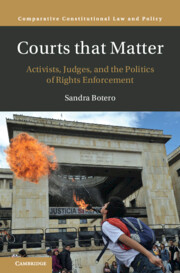
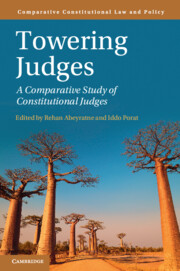
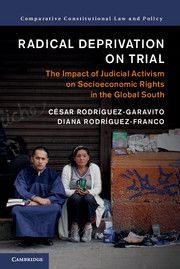
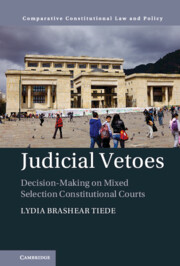
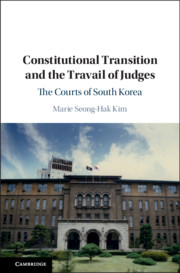
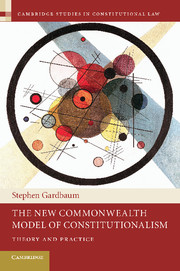
.jpg)

